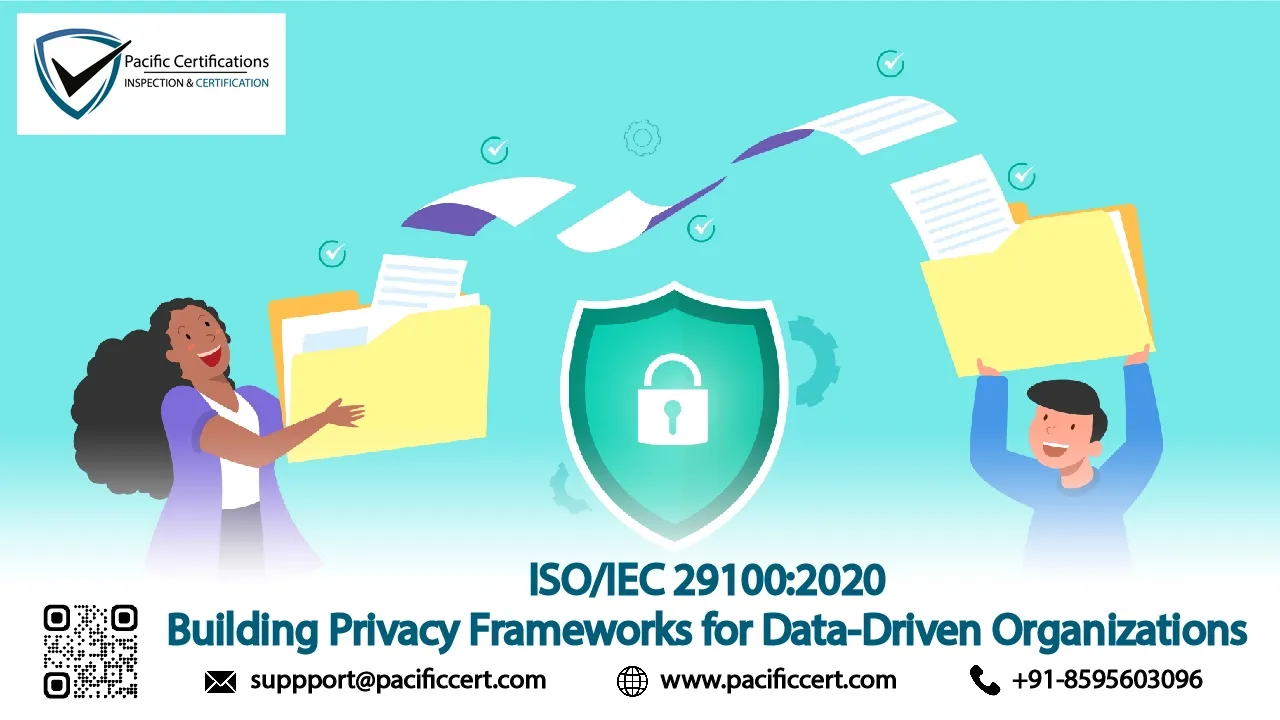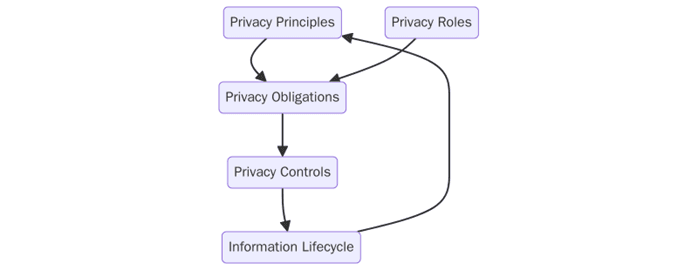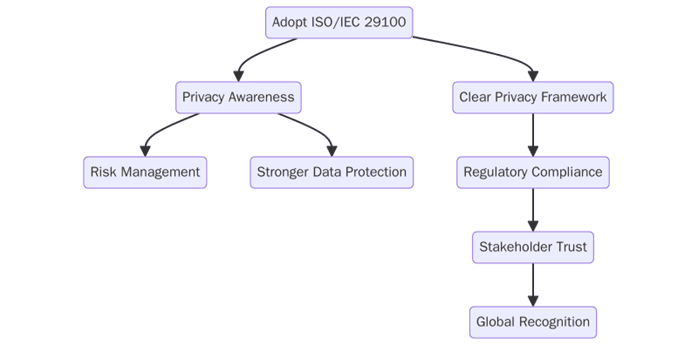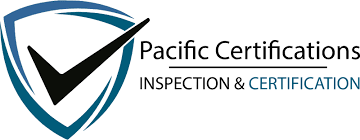ISO/IEC 29100:2020 - Building Privacy Frameworks for Data-Driven Organizations

In a world where data powers everything from digital services to artificial intelligence, privacy is at the heart of customer trust and regulatory compliance. Institutions that collect, process and share personal data must prove that privacy is embedded into their systems, not added as an afterthought. Without a clear framework, privacy risks can lead to regulatory fines, reputational damage and loss of business opportunities.
ISO/IEC 29100 provides a structured privacy framework that defines key principles, roles and practices for handling personal data responsibly. It helps institutions build systems that align with laws, meet partner expectations and reassure customers that their information is safeguarded. By adopting ISO/IEC 29100, data-driven institutions can integrate privacy into governance, processes and technologies while maintaining accountability and transparency.
Schedule a 15-minute call with an auditor at Pacific Certifications to map your certification pathway!
Quick summary
"ISO/IEC 29100:2020 sets out an overarching privacy framework that institutions can use to manage personal data across operations, vendors and systems. It introduces concepts such as purpose limitation, consent management, accountability and data minimization. Institutions applying this framework can track KPIs like data access review cadence, incident closure times, consent withdrawal turnaround and SLA compliance with third party processors."
Introduction
As data volumes grow, so do the risks of unauthorized access, misuse and breaches. Regulators worldwide, from Europe’s GDPR to California’s CCPA, have put strict requirements on how personal data is collected, stored and used. Institutions that fail to show compliance risk heavy fines and reputational harm.
ISO/IEC 29100:2020 bridges the gap between legal obligations and operational practice. It establishes a privacy framework that is technology-neutral and applicable to all types of institutions, whether they operate in e-commerce, healthcare, finance or public administration. This standard helps ensure that privacy safeguards are consistent, auditable and adaptable to changing regulatory environments.
Why ISO/IEC 29100 is important for data-driven institutions?
Privacy is not only a regulatory requirement but also a competitive differentiator. Customers increasingly choose platforms that show respect for their data and provide transparent controls. ISO/IEC 29100 allows institutions to go beyond minimum compliance by creating a privacy culture backed by documented processes and measurable outcomes.
It helps integrate privacy with existing certifications such as ISO/IEC 27001 for information security and ISO 22301 for business continuity. This makes it easier to prove that data protection is part of a broader governance framework, strengthening confidence with regulators, investors and clients.
ISO/IEC 29100:2020 quick reference table
Area | Key controls | Sample evidence | Useful KPIs and SLAs |
Governance and scope | Privacy policy, scope, stakeholder map, roles | Approved policy, scope note, RACI, stewardship charters | Policy review cadence, ownership coverage |
Principles in practice | Purpose limitation, data minimization, accountability, transparency | Principle to control mapping, public notice, consent language | Notice refresh cycle, exceptions rate |
Roles and responsibilities | Controller, processor, custodian duties and approvals | Role definitions, onboarding checklists, delegation matrix | Role assignment coverage, approval turnaround |
Consent and lawful basis | Consent capture, withdrawal, alternative lawful bases | Consent logs, withdrawal tickets, basis register | Consent withdrawal time, invalid consent rate |
Data subject rights | Access, correction, deletion, portability, objection | DSAR queue, response packages, redaction checklist | DSAR response time SLA, reopen rate |
Privacy by design | Risk screening, DPIA, design reviews, approvals | DPIA reports, design review minutes, sign offs | DPIA completion time, high risk items mitigated |
Data sharing and processors | Due diligence, contracts, flow down, oversight | Vendor assessments, contract clauses, monitoring logs | Processor screening coverage, SLA compliance |
Security and access control | Least privilege, authentication, encryption, key management | Access reviews, key inventories, control tests | Access review cadence, privileged access age |
Retention and disposal | Schedules, legal holds, defensible deletion | Retention matrix, deletion logs, hold registers | Deletion success rate, policy exceptions |
What are the requirements for ISO/IEC 29100?
To apply ISO/IEC 29100:2020, institutions must adopt its principles and embed them into everyday operations. The requirements include:

- Define scope and boundaries of personal data processing across products, services and departments
- Develop privacy policies covering data collection, usage, retention and disposal
- Identify roles and responsibilities for data controllers, processors and custodians
- Conduct risk assessments for privacy threats such as unauthorized access, identity theft and profiling
- Document processes for consent management, data minimization and purpose limitation
- Provide evidence records such as consent logs, access review reports and data handling audits
- Train staff on privacy principles, reporting obligations and incident response
- Implement operational controls including encryption, anonymization and role-based access
- Carry out internal audits on privacy practices and gap remediation
- Leadership reviews of KPIs, incidents and privacy objectives
- Correct non-conformities with documented improvements and tracking
How to prepare for ISO/IEC 29100:2020 certification?
Preparation requires institutions to align current privacy practices with ISO/IEC 29100 principles and build documentation that auditors can verify. Key steps include:
1. Conduct a gap analysis between existing privacy practices and ISO/IEC 29100 requirements
2. Update privacy policies to reflect purpose limitation, consent and transparency rules
3. Train employees on roles, accountability and handling sensitive data
4. Maintain evidence such as incident reports, access logs and third party compliance records
5. Implement privacy controls in IT systems, vendor contracts and customer interfaces
6. Run trial audits to test readiness and close identified gaps
7. Engage leadership to oversee scope, allocate resources and review performance
Certification audit
Stage 1 audit: Reviews scope, privacy policies, documented processes and risk assessments.
Stage 2 audit: Evaluates how privacy controls are implemented in IT systems, contracts and operations.
Non-conformities: Must be corrected with documented proof before approval.
Management review: Confirms leadership oversight and resource allocation for privacy.
Final certification: Awarded once compliance gaps are resolved.
Surveillance audits: Conducted annually to ensure privacy controls remain effective.
Recertification audits: Required every three years to maintain certification.
What are the benefits of ISO/IEC 29100?
ISO/IEC 29100:2020 provides institutions with a consistent framework for privacy that strengthens trust and supports compliance. It helps reduce risks, improve transparency and build long-term credibility. The main benefits include:

- Global recognition of privacy practices aligned with international standards
- Stronger compliance with privacy regulations and laws such as GDPR and CCPA
- Improved customer trust through transparent data handling
- Better vendor accountability with SLA based privacy obligations
- Reduced risk of breaches and fines through structured controls
- Measurable improvement via KPIs such as incident response times and audit closure rates
In recent years, ISO/IEC 29100 has gained adoption as institutions expand digital services and face stricter privacy regulations. Many organizations are integrating it with ISO/IEC 27001 to create comprehensive security and privacy programs. Vendors are increasingly being required to meet ISO/IEC 29100 principles as part of supplier onboarding, and institutions are tracking KPIs such as consent withdrawal turnaround, access review cadence and SLA compliance with data processors.
Dashboards showing privacy metrics are also becoming common, allowing institutions to share real-time visibility of compliance and strengthen customer confidence. This reflects a shift where privacy is not just a compliance obligation but a competitive advantage.
Contact us
Pacific Certifications provides accredited ISO/IEC 29100 certification services for institutions worldwide. Our audits help build privacy frameworks that strengthen governance, safeguard customer trust and align with regulatory expectations.
Request your ISO audit plan and fee estimate, we will help you map Stage 1 and Stage 2 timelines and evidence requirements for your institution. Contact us at [email protected] or visit www.pacificcert.com.
Ready to get ISO certified?
Contact Pacific Certifications to begin your certification journey today!
Suggested Certifications –
Read more: Pacific Blogs

